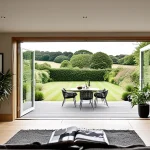Practical Steps to Make Your UK Home Decor More Sustainable
When aiming for sustainable home decor, start by choosing eco-friendly paint and finishes. Opt for low-VOC or natural paints that reduce indoor air pollution and environmental impact. These options promote healthier living environments, aligning with UK sustainable living principles.
Incorporating second-hand or vintage decor finds is another effective step. These pieces prevent waste by extending the life cycle of items and add unique character to your space. Many UK stores and online platforms specialize in curated vintage goods, making eco-friendly decorating ideas accessible and stylish.
Also read : How Could Recent Developments in the UK Influence Its Future Standing Globally?
Durability and timeless design should guide furniture choices. Select well-crafted pieces that withstand time, reducing the need for frequent replacements. Investing in classic styles supports both sustainability and long-term cost savings.
Together, these practical steps blend aesthetics with responsibility, helping homeowners in the UK create spaces that reflect eco-conscious values without sacrificing style or comfort.
Also to discover : How are UK tech companies innovating in the digital age?
Sustainable Materials for Home Interiors
Selecting sustainable materials is a cornerstone of creating a truly eco-friendly home. Opt for FSC-certified wood, bamboo, or reclaimed materials that guarantee responsible forest management and reduce deforestation. These materials not only minimize environmental impact but also add authentic texture and warmth to your home interiors.
When it comes to textiles, fabrics like organic cotton, hemp, and linen are excellent choices for sustainable home decor. These textiles are grown without harmful pesticides and use less water compared to conventional cotton. Incorporating these materials in upholstery, curtains, or cushions aligns perfectly with UK sustainable living values.
Choosing eco-friendly furnishings made from these materials enhances not just the look but also the sustainability of your space. Several UK-made brands focus on producing natural home decor UK, emphasizing craftsmanship and environmental responsibility. By prioritizing these products, homeowners support local economies, reduce carbon footprints from shipping, and ensure transparency in sourcing.
Integrating sustainable materials requires weighing durability alongside environmental concerns. It’s about selecting items that last, reducing waste over time. This approach complements eco-friendly decorating ideas by delivering homes that are both beautiful and kind to the planet.
Energy-Efficient Accessories and Features
Enhancing your home with energy-efficient accessories plays a crucial role in UK sustainable living. Start by installing LED bulbs and smart lighting solutions. LED bulbs consume significantly less electricity than traditional bulbs and last longer, reducing both energy use and waste. Smart lighting can be programmed or motion-activated, preventing unnecessary power consumption and increasing convenience.
Thermal curtains and energy-saving window treatments offer effective insulation, keeping warmth inside during colder months and reducing reliance on heating systems. This approach cuts energy bills and lowers your home’s carbon footprint, essential aspects of sustainable home decor.
UK regulations encourage energy efficiency, with schemes like the Energy Performance Certificate (EPC) guiding homeowners to measure and improve their home’s energy use accurately. Leveraging these tools helps identify areas needing upgrades, ensuring you invest in the most impactful energy-saving features.
By integrating these UK eco accessories, you not only boost comfort but also adhere to national environmental goals. This strategy complements eco-friendly decorating ideas by blending functionality with sustainability, making your home both stylish and efficient.
Upcycling and DIY Projects for Eco-Conscious Decor
Upcycling home decor offers a creative, sustainable home decor option that reduces waste while adding unique character to your space. By transforming unwanted or discarded items into stylish new pieces, you engage directly with UK sustainable living principles that emphasize reuse and resourcefulness.
For example, repurposing old wooden pallets into shelves or converting glass jars into decorative storage combines functionality with eco-consciousness. Such DIY sustainable projects are accessible even to beginners and require minimal investment.
Simple DIY guides often suggest painting, sanding, or adding fabric trims to revitalize old furniture or accessories. These approaches align with eco-friendly decorating ideas by extending product lifespans and reducing demand for new manufacturing.
Communities across the UK actively share inspirations online, showcasing before-and-after transformations that motivate others to explore upcycling home decor. Additionally, many local workshops offer hands-on classes, encouraging sustainable creativity while building social connections.
By embracing this approach, homeowners not only reduce their environmental footprint but also personalize their interiors uniquely and affordably. This strategy complements broader UK sustainable living efforts, proving that eco-consciousness can be both practical and enjoyable.
Sourcing Ethical and Eco-Friendly Furnishings in the UK
Finding ethical homeware UK involves understanding certifications that verify sustainable production. Trusted eco-labels, such as FSC, Rainforest Alliance, or Soil Association Organic, ensure that furnishings meet strict environmental and social standards. These labels help shoppers confidently select buy eco-friendly decor UK options that reduce ecological impact and promote fair labour.
In the UK, several sustainable furniture shops specialize in products crafted from reclaimed wood, organic textiles, and non-toxic finishes. Retailers often emphasize transparency about sourcing and production processes, giving consumers peace of mind. Supporting these outlets not only advances UK sustainable living but also encourages businesses to raise industry standards.
Choosing to buy from local artisans and small businesses enhances this commitment further. These makers often use traditional techniques paired with sustainable materials, producing unique pieces with a lower carbon footprint. Prioritizing such purchases fosters community resilience, reduces shipping emissions, and preserves craft heritage.
By focusing on ethical certifications, reputable UK suppliers, and local artisans, homeowners can seamlessly integrate style with responsibility. This approach aligns with broad eco-friendly decorating ideas while directly supporting sustainable economic practices in the UK.






